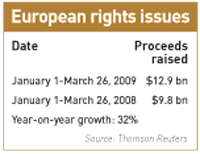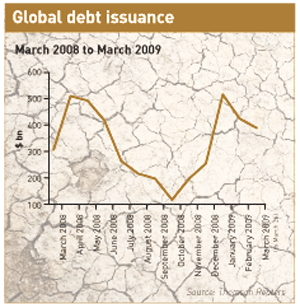Listed companies are struggling to raise capital due to falling revenues and tougher lending conidtions. IR teams have to adapt to new capital structures.
‘Inaction is not an option,’ said JPMorgan analysts in a note, after assessing the financial outlook for Brixton, a London-listed property firm. The same is true for many others as a combination of falling revenues and tighter lending conditions puts the squeeze on listed firms.
The result is a great thirst for capital. Equity and bond markets have seen near-record levels of activity since the start of the year as companies tap investors, banks, sovereign wealth funds and any other source of capital they can get their hands on. The best option for Brixton, according to JPMorgan, would be a rights issue, except it would be ‘at the back of the queue’, with cash calls of £2.5 bn ($3.7 bn) already announced in the commercial property sector this year.
Across the world scores of companies have announced rights issues. Some estimate the sum raised in Europe alone during 2009 could be as high as €300 bn ($405 bn); since the start of the year, capital raised is up almost a third on 2008 (see European rights issues, right). Among the biggest planned are banking group HSBC’s £12.5 bn rights issue and a £1 bn cash call from plumbing firm Wolseley.
All this means a flurry of investor relations activity. IR duties during a rights issue can include sitting on steering committees, planning and attending post-announcement roadshows, coordinating the issue across different jurisdictions, and many other tasks. And demands rise as the capital raising approaches, because shareholders usually wait until the last minute before deciding whether to participate.
The problem for issuers is they must jostle with each other to access the limited pool of capital on offer. One option is to make the offer deeply discounted. In March CRH, the world’s second-largest building materials company, announced that investors could take up two new shares for every seven ordinary shares at a 45 percent discount to the previous day’s closing price. The Dublin-based firm said the proceeds would be used to pay off debt and fund future acquisitions.
The issue of funding
Finding underwriters for rights issues has also been an issue, with banks short of cash and unwilling to take risks while equity markets remain volatile. In March, TM International, the Malaysian mobile phone operator, ran into trouble after struggling to guarantee full underwriting cover for its RM5.25 bn ($1.48 bn) cash call. In the end a consortium of banks stepped in to fill the gap, highlighting the need for issuers to diversify their sources of funding.
Indeed, the high number of companies coming to market belies the tough new conditions financial institutions are demanding in return for support. Clearly stung by criticism that they failed to reign in management in the boom years, institutional investors have taken a hard line when asked to back calls for capital.
Taking advantage
As a result, corporate governance advocates now have a golden opportunity to push for greater accountability and transparency. A case in point is Hermes Equity Ownership Services (HEOS), the advisory arm of UK pension fund Hermes, which advises clients with assets worth roughly £50 bn and is partly invested in around 2,800 US firms. It has long complained about a lack of board and proxy access in the US, but to little effect. Bess Joffe, a Canadian qualified lawyer, joined HEOS in 2005 as head of the Americas region. She feels now is ‘a prime opportunity’ to push for changes, especially at financial firms.
In the UK, television broadcaster ITV found during informal discussions that some leading shareholders would support a rights issue only if chief executive Michael Grade stepped into a lesser role. Grade arrived in 2007 with a business plan he said would revitalize ITV, but since then the company has suffered a sharp decline in revenues and share price.
‘Shareholders are pretty keen to get a new CEO, and if the company were to try to raise capital it probably would be a pre-condition,’ one ITV investor told the Financial Times.
Governance advocates are not having it all their own way, however. Given the tough conditions, regulators are loosening the rules around capital raising to help companies that need to tap the market. This follows the disastrous attempts by UK banks to run rights issues last summer, during which their shares came under heavy selling pressure.
Bursa Malaysia, the Malaysian stock exchange, has revealed plans to lift the maximum amount of new shares an issuer can raise on a non-pro-rata basis to 20 percent of current equity. The move would make it easier for companies to undertake capital raisings, although this would come at the expense of existing shareholders (see Preemption rights and wrongs, below).
Singapore Stock Exchange in February unveiled a raft of measures to help issuers raise capital. These include raising the amount of new capital that can be issued without shareholder approval from 50 percent to 100 percent of current equity, allowing bigger discounts on share placings, and relaxing underwriting conditions. The changes reflect the scale of the challenge that capital raising has become.
To get around the problems they face, finance teams are having to search for new sources and methods of capital. This has led to an increase in the number of private placings, debt-for-equity swaps, convertible bonds and other more obscure techniques, such as cash-box transactions (see Movers and shakers, below).
US car maker General Motors was struggling in March to agree a debt-for-equity swap that would reduce its debt burden. Its rival Ford is in a better position after arranging more than $20 bn of debt financing in 2006, shortly before credit markets seized up.  Tougher times ahead
Tougher times ahead
Experts at Deloitte, the financial services firm, say finance divisions can expect ‘to operate in an environment of tighter debt-to-equity ratios, restrictions on use of capital and investments, and reporting requirements to providers of capital. Many firms will have to upgrade their treasury systems and talent to meet this challenge.’
In one example, BMW, the luxury German car manufacturer, has been improving processes and disclosure to cater to more debt investors this year, through a joint effort between a member of the IR team and the corporate treasurer. The same is true at many other issuers given the near-record levels of corporate debt issuance in the first months of 2009 (see Global debt issuance, right).
Of course, all this debt will have to be paid back at some point, either in cash or with shares. Right now, however, finance departments are more worried about continuing as a going concern.
Preemption rights and wrongs
The squeeze on companies has led to renewed debate over the status of preemption rights. These protect shareholders from dilution when companies issue new shares, by giving existing investors first right of refusal.
But the difficult conditions in capital markets have made rights issues look unappealing. Last year, UK banks suffered dramatic falls in their share prices while attempting rights issues, while underwriters were left with large chunks of equity they didn’t want.
As a result, alternative methods of capital raising, such as private placings, debt-for-equity swaps and cash-box transactions, look more attractive. These transactions enable companies to raise capital quickly and efficiently. The problem is they often leave existing shareholdings diluted, and governance advocates hot under the collar.
Peter Montagnon, director of investment affairs at the Association of British Insurers, a powerful shareholder lobby group, told IR magazine earlier this year he is ‘not comfortable with events and has made this known to the underwriting community.’
This is not just a British issue, either: Bursa Malaysia has been criticized for its plans to lift the amount of share capital companies can raise while avoiding preemption rights from 10 percent to 20 percent of existing equity.
Movers and shakers
On the up
Convertible bonds Growing in popularity now equity markets appear to have stabilized. Following strong demand in March, ArcelorMittal, the world’s largest steel company, increased the size of its convertible bond issue from €750 mn to €1.1 bn ($1 bn to $1.5 bn).
Debt-for-equity swaps Often a last option for companies facing unbridgeable financing commitments. Debt-for-equity swaps dilute existing shareholdings and may effect a change in control at the company. Analysts say companies like UK property firm Brixton may be forced to do them as rights issues look too tricky to pull off.
Vulture funds Expect more cash-rich vulture funds, financed by a mix of sovereign wealth funds, private banks and family office funds located in developing and developed economies, says Richard Davies, incoming chairman of the UK’s IR Society. They are there to snap up assets on the cheap where they see huge discounts to net asset value in asset-backed businesses.
Cash-box transactions A corporate finance maneuver used by UK issuers to issue new shares worth up to 10 percent of existing equity without seeking shareholder approval. Tullow Oil encountered opposition from investors when it used this method to raise capital in January.
Staying put
Rights issues Many have been announced since the start of 2009, but the limited cash on offer and difficulty in finding underwriters has led issuers to consider alternative forms of capital formation.
Going down
Private equity The private equity boom disappeared as fast as cheap credit when the world’s money markets froze. Many are now shifting their resources to areas like vulture funds to take advantage of the financial difficulties faced by many firms and countries.










